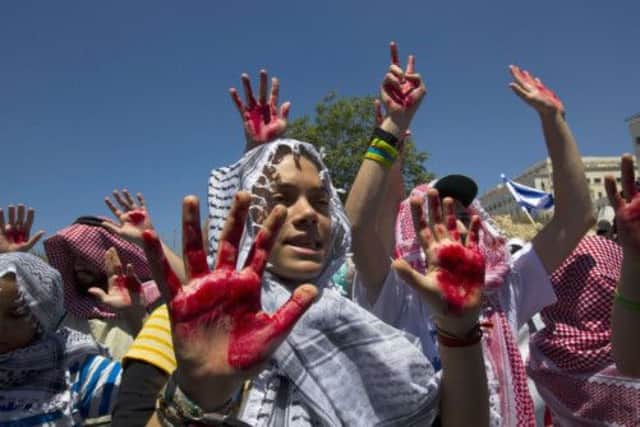Israeli-Palestinian peace talks restart


The talks are scheduled to resume in Washington this evening and tomorrow and will be conducted by senior aides to Israeli prime minister Benjamin Netanyahu and Palestinian president Mahmoud Abbas. The statement came hours after Israel approved the release of more than 100 Palestinian prisoners.
The release – which split the Israeli cabinet – is to take place in stages over several months.
Advertisement
Hide AdAdvertisement
Hide Ad“Both leaders have demonstrated a willingness to make difficult decisions that have been instrumental in getting to this point. We are grateful for their leadership,” Mr Kerry said in a statement.
Middle East analysts voiced scepticism that the talks might lead to a peace treaty to end the more than six-decade conflict that has defied two decades of US efforts to broker a solution.
A US state department spokeswoman suggested the initial talks would be to chart a way forward rather than try to tackle the thorny issues between the two sides.
Major sticking points include the future of Israeli settlements on the West Bank, the status of Jerusalem and the fate of Palestinian refugees.
The issue of settlement-building halted the last direct talks in September 2010.
Settlements are considered illegal under international law, although Israel disputes this. However, outside the government complex, hundreds protested against a release of prisoners. Among them were families of Israelis killed in attacks by Palestinian militants. Some held up pictures of their loved ones.
Naftali Bennett, the head of Jewish Home, briefly joined the protesters before attending the cabinet meeting to decide on the prisoners’ fate. “It’s a hard day, the decision was made and I hope we won’t pay a horrible price for this in the future,” he said after the vote.
In the West Bank and Gaza, some relatives of prisoners anxiously awaited word. “Now there is a big relief,” said Walid Abu Muhsen, 45, whose brother Jamal has been in prison for the past 22 years for killing an Israeli farmer.
Advertisement
Hide AdAdvertisement
Hide AdThe first disagreements emerged just hours after the cabinet vote, reflecting the hostility and deep mistrust between the two sides. Under the deal brokered by Mr Kerry, Israel is supposed to free 104 prisoners who carried out attacks before the first interim peace agreements of the early 1990s.
Palestinian negotiators handed Mr Kerry a list of 104 prisoners, arrested between 1983 and 1994. They said Mr Kerry assured them Israel would release the prisoners in four stages over several months, with each release linked to progress in negotiations.
Among the 104 prisoners on the Palestinian list are two dozen who either have Israeli citizenship or come from Israeli-annexed east Jerusalem. In the past, Israeli media have said Israel would not free them.
Yesterday evening, an official in Mr Netanyahu’s office said that no Israeli Arabs were among the 104 whose release was authorised by the cabinet.
Israeli analyst Yossi Alpher said that a prisoner release in stages gives Netanyahu additional leverage during negotiations. “Netanyahu has given himself a carrot that he can hold out to the Palestinians,” he added. “Netanyahu can refuse to release the later batches if there’s no progress.”
The Israeli cabinet approved the release of Palestinian prisoners by 13 votes to seven yesterday.
Mr Netanyahu said: “This moment is not easy for me, is not easy for the cabinet ministers, and is not easy especially for the bereaved families, whose feelings I understand.”